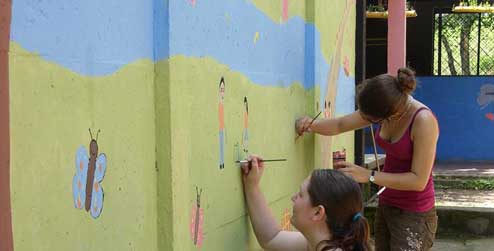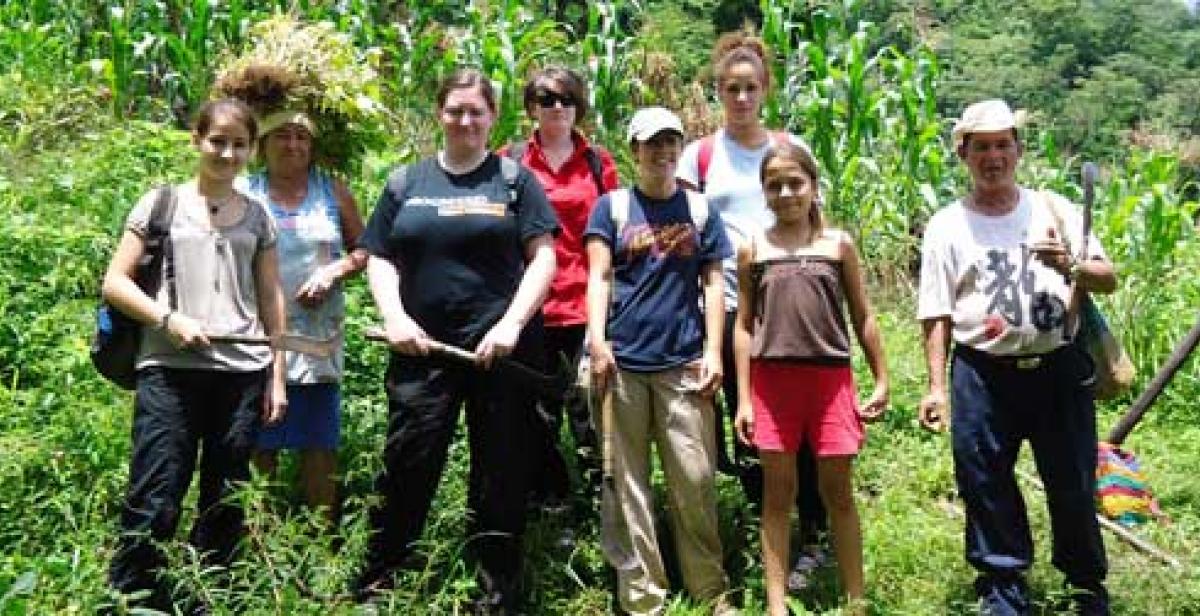I wasn’t sure what this blog's theme would be, I intended to just update you on the week’s activities but it seems to have evolved into a blog about the environment.
Climate change mural
After being ill, I got back to work on Wednesday, where we finished the climate change mural in the school. I painted a few flowers – I was afraid to do anything important and mess it up as it looked really good.
But as usual in El Salvador, “Latin American timing” (of always being late) meant that we had to wait four hours in the rain for a lift home!

Thursday, we spent the day painting the inside of a small church in the neighbouring community, which was really good because we got quite a few local people popping in and telling us how grateful they were for our help and that they really appreciated the work we were doing, one lady even went to the shop to buy us apples!
We discovered that the priest requested help from the local people as a farm owner has been taken ill and was not able to work. We offered to help and spent the morning working on the cornfield.
This involved climbing for an hour up a mountain, alongside a few local people who were also coming to help out – once again an example of how the community help each other (there’s no relying on government sick benefits here!)
Carlos and the war
The man that joined us, Carlos, was an individual! He told us about his experiences during the war, how he was a founding member of the political party that pushed for political change and spoke out against government repression.
During the war he joined the guerrilla army and I could tell he felt the need to justify his reasons for his involvement in the war. He explained more about the horrible repression many people in this community faced before the war; how the land in this country was concentrated in the hands of only fourteen families and the farmers began to create unions to lobby for better treatment for their hard agricultural labour.
He explained that the government began a system of violent repression against these farmers and so the trip we were making to the cornfields had become impossible for them to make without risking their lives. His reason for joining the fight against the government in the guerrilla army was simply to protect himself and his family.
Working on the cornfield
After our long walk we finally made it to the cornfield, and turned to see a beautiful backdrop of mountains and greenery in every direction. With a machete each we began our work, chopping down weeds in between the corn. It was tiring, hot and we kept getting bitten all the time!
It took a long time as were much slower than the local ‘experts’! I learned that they plant twice in the 6 month rainy period and that they need to complete the long weeding process at least twice a month; a lot of work for very little remuneration – corn is quite a low value commodity.
Carlos commented that he never thought we would actually come to help at the farm. It seems that the people here appreciate our help in everything we are doing but the corn is their livelihood, it means everything to them and weeding is hard work, especially in the heat so they couldn’t be more grateful or more complimentary of the work we did today.
Ernestina, a lady we worked alongside, said that she doesn’t have any money to pay us so she can’t thank us enough for our help. I think what I’m trying to describe is how I can see that helping them on the cornfields means a lot and I think that they are surprised to see Westerners doing such hard graft to help with something that means that much to them.
Thinking development sustainably
Our time on the farm also gave us a chance to reflect on environmental sustainability. A big environmental issue in El Salvador is the fact that it has the second highest rate of deforestation in Latin America, just behind Haiti.
Caused by agricultural activities and rising urbanisation, deforestation has resulted in 50% of land in the country being unsuitable for food cultivation and making the earth more susceptible to landslides, of which the country has suffered in recent years causing many fatalities as well as destruction of homes.
Secondly, climate change has caused uncertainty over the environment; last year many local communities had too much rain and faced flooding. But this year the rain season arrived a month late, which has a massive impact on agriculture and can mean that they face food shortages.
It also meant that the nearby village of Los Pozos (where we painted the mural) went without any water for the entire community for a period of three days; this situation is predicted to worsen in the coming years as the UN has recognised El Salvador as a prominent country to face severe water shortages.
Despite this we have learnt that a large Canadian mining company are suing the Salvadoran government for trying to prevent them from building more mines in the country; these mines use more water in an hour than en entire family would use in one year.
Joined up development
Developed countries continue to preach about the importance of economic development and opening up 'free trade' but doing so in this situation could lead to horrible environmental consequences for El Salvador which in turn will cause a massive increase in poverty.
This is an example of how a focus on economic development without an equal consideration into environmental impacts can literally destroy years of work to eradicate poverty and suffering in developing countries.
Natasha Kendrick in an Empower volunteer in El Salvador.



